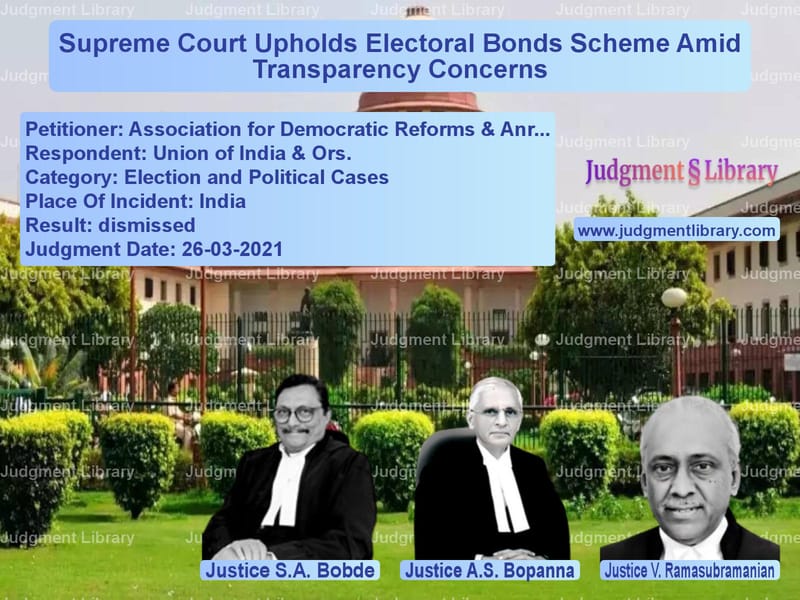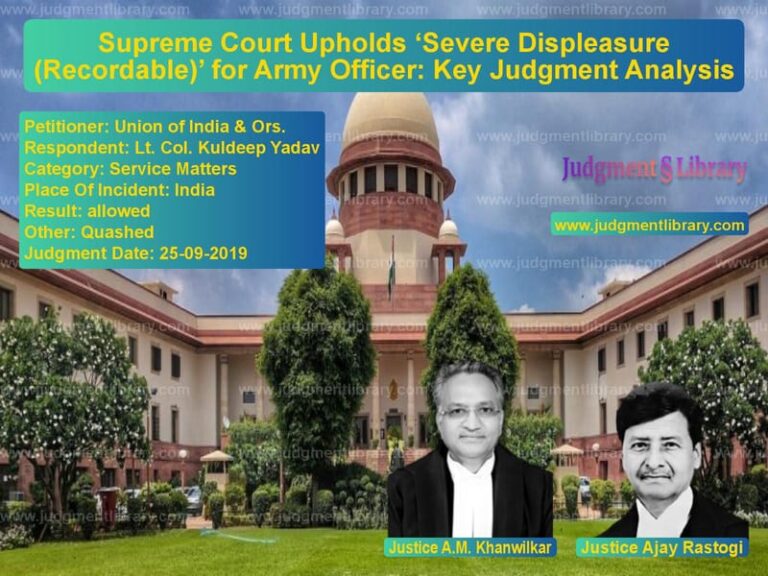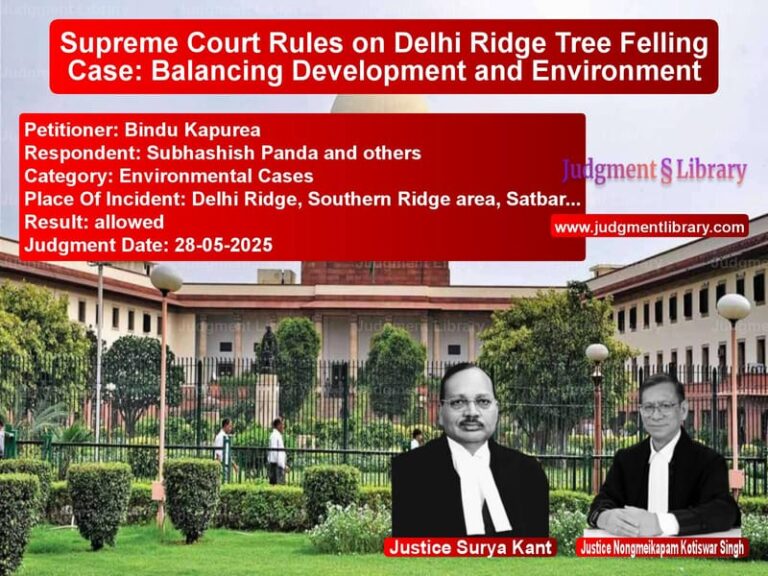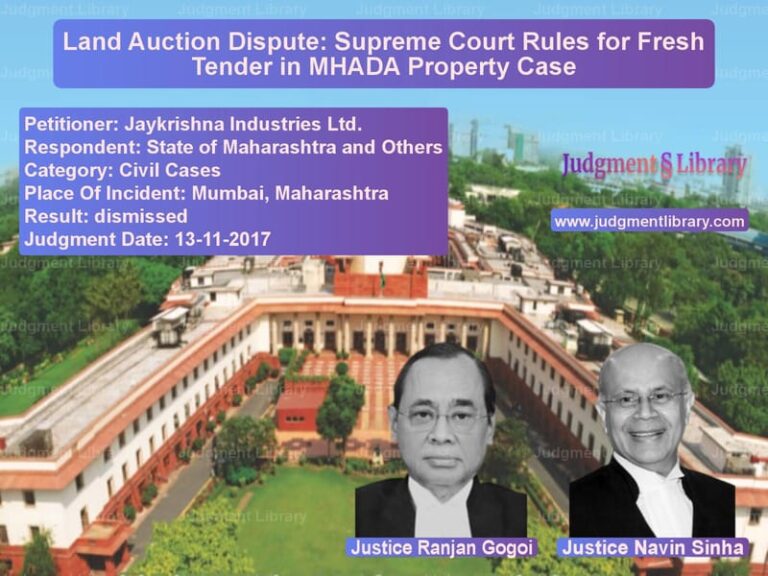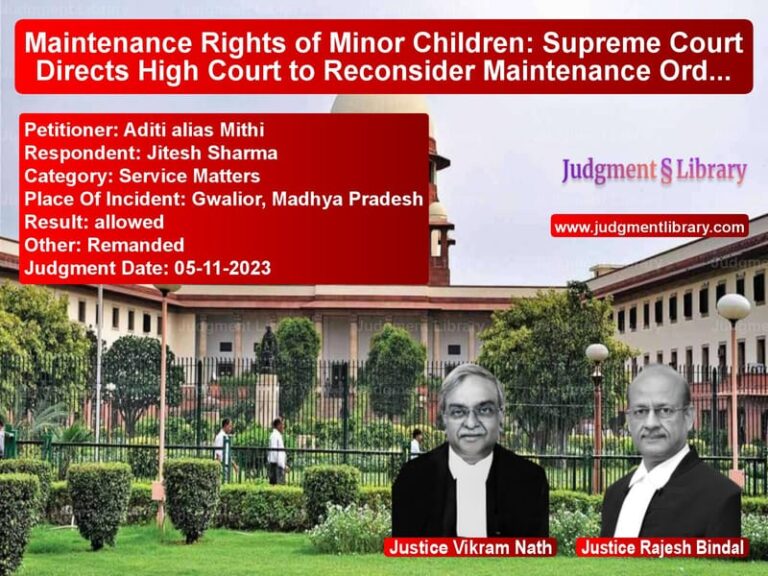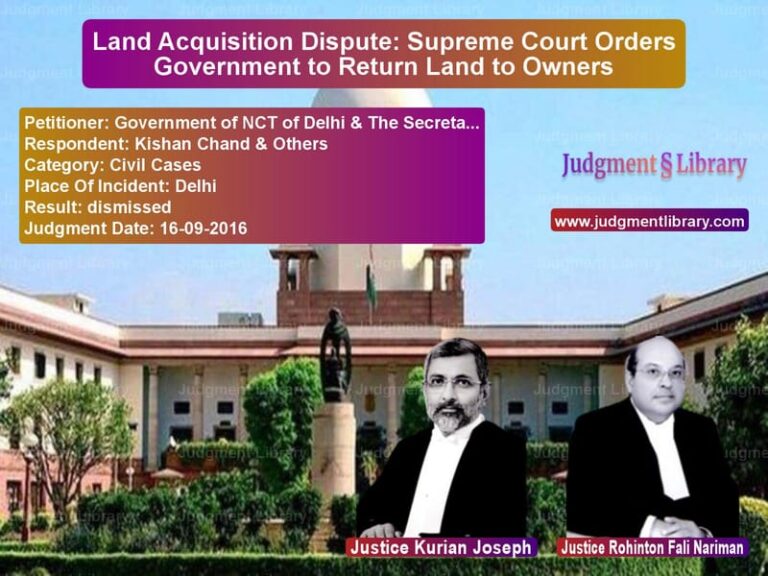Supreme Court Upholds Electoral Bonds Scheme Amid Transparency Concerns
The Supreme Court of India has delivered a crucial judgment in the case of Association for Democratic Reforms & Anr. v. Union of India & Ors., dealing with the constitutionality of the Electoral Bonds Scheme, 2018. This case revolved around the legality and transparency of political funding through electoral bonds and raised concerns about the potential misuse of anonymous corporate donations in influencing elections.
Background of the Case
The petitioners, Association for Democratic Reforms (ADR) and Common Cause, filed a Public Interest Litigation (PIL) challenging the amendments introduced through the Finance Act, 2017, which modified several laws, including the Reserve Bank of India Act, 1934, the Representation of the People Act, 1951, the Income Tax Act, 1961, the Companies Act, 2013, and the Foreign Contribution (Regulation) Act, 2010. These amendments paved the way for anonymous donations to political parties through electoral bonds.
The petitioners argued that the scheme violated the fundamental right to information by allowing political parties to receive unlimited corporate and foreign donations without disclosing the donors’ identities. They also contended that the scheme encouraged money laundering and quid pro quo arrangements between corporate donors and political parties.
Petitioners’ Arguments
The petitioners raised the following key points:
- The electoral bonds scheme allowed unlimited anonymous donations to political parties, which could lead to corporate influence in policymaking.
- By removing the requirement for political parties to disclose donor details under the Representation of the People Act, 1951, the scheme violated the fundamental right to information.
- The amendments to the Companies Act, 2013 removed the cap on corporate donations, allowing even loss-making companies to contribute to political parties.
- The amendments to the Foreign Contribution (Regulation) Act, 2010 permitted foreign companies operating in India to donate to political parties, raising concerns about foreign influence on elections.
- The lack of transparency in political funding facilitated money laundering and undermined free and fair elections.
Respondents’ Arguments
The Union of India and the Election Commission of India defended the scheme with the following arguments:
- The scheme was introduced to eliminate black money in political funding by ensuring that donations were made through banking channels.
- Electoral bonds could only be purchased by Indian citizens and companies incorporated in India, thereby preventing foreign influence.
- The scheme maintained a balance between donor privacy and transparency by requiring banks to keep records of purchases.
- The removal of the corporate donation cap encouraged greater corporate participation in democracy.
- The Election Commission had access to information regarding donations and could investigate any irregularities.
Supreme Court’s Observations
The bench, comprising Chief Justice S.A. Bobde, Justice A.S. Bopanna, and Justice V. Ramasubramanian, analyzed the arguments and made the following key observations:
1. Balance Between Transparency and Donor Privacy
“While transparency in political funding is essential, complete disclosure of donor identities may discourage legitimate contributions due to fear of political retribution.”
The Court recognized the need to balance transparency with the donors’ right to privacy and security.
2. Electoral Bonds and Banking Channels
“The scheme mandates that all donations be made through banking channels, thereby reducing the scope of black money in political funding.”
The Court emphasized that requiring donations to be routed through banks helped in tracking transactions and curbing illicit funding.
3. Foreign Influence Concerns
“Electoral bonds can only be purchased by Indian citizens and companies registered in India, thereby limiting the scope of foreign influence.”
The Court rejected the argument that the scheme facilitated foreign interference in elections.
4. Election Commission’s Oversight
“The Election Commission of India has the authority to monitor political party funding and seek disclosures when necessary.”
The Court found that the Election Commission had sufficient powers to regulate and investigate potential abuses.
Supreme Court’s Verdict
The Supreme Court ruled as follows:
- The Electoral Bonds Scheme, 2018 was upheld, and the petitions challenging its validity were dismissed.
- Political parties were directed to submit sealed records of electoral bond donations to the Election Commission for periodic review.
- The government was advised to consider additional safeguards to enhance transparency without compromising donor privacy.
- The Election Commission was granted authority to audit political party funding if discrepancies were found.
Impact of the Judgment
The ruling has several implications:
- The electoral bonds scheme remains a valid mode of political funding.
- Political parties are now subject to greater scrutiny from the Election Commission.
- The judgment reinforces the government’s push for digital and traceable political contributions.
- It provides a legal framework for corporate donations to political parties.
Conclusion
The Supreme Court’s judgment in this case establishes a precedent for political funding transparency while balancing donor privacy. While the scheme remains intact, political parties are now under increased regulatory oversight. The ruling will shape the future of electoral finance in India and influence upcoming legal debates on political donations.
Read also: https://judgmentlibrary.com/sarpanch-no-confidence-motion-supreme-court-reinstates-collectors-order/
Petitioner Name: Association for Democratic Reforms & Anr..Respondent Name: Union of India & Ors..Judgment By: Justice S.A. Bobde, Justice A.S. Bopanna, Justice V. Ramasubramanian.Place Of Incident: India.Judgment Date: 26-03-2021.
Don’t miss out on the full details! Download the complete judgment in PDF format below and gain valuable insights instantly!
Download Judgment: association-for-demo-vs-union-of-india-&-ors-supreme-court-of-india-judgment-dated-26-03-2021.pdf
Directly Download Judgment: Directly download this Judgment
See all petitions in Public Interest Litigation
See all petitions in Legislative Powers
See all petitions in Fundamental Rights
See all petitions in Judgment by S. A. Bobde
See all petitions in Judgment by A. S. Bopanna
See all petitions in Judgment by V. Ramasubramanian
See all petitions in dismissed
See all petitions in supreme court of India judgments March 2021
See all petitions in 2021 judgments
See all posts in Election and Political Cases Category
See all allowed petitions in Election and Political Cases Category
See all Dismissed petitions in Election and Political Cases Category
See all partially allowed petitions in Election and Political Cases Category

